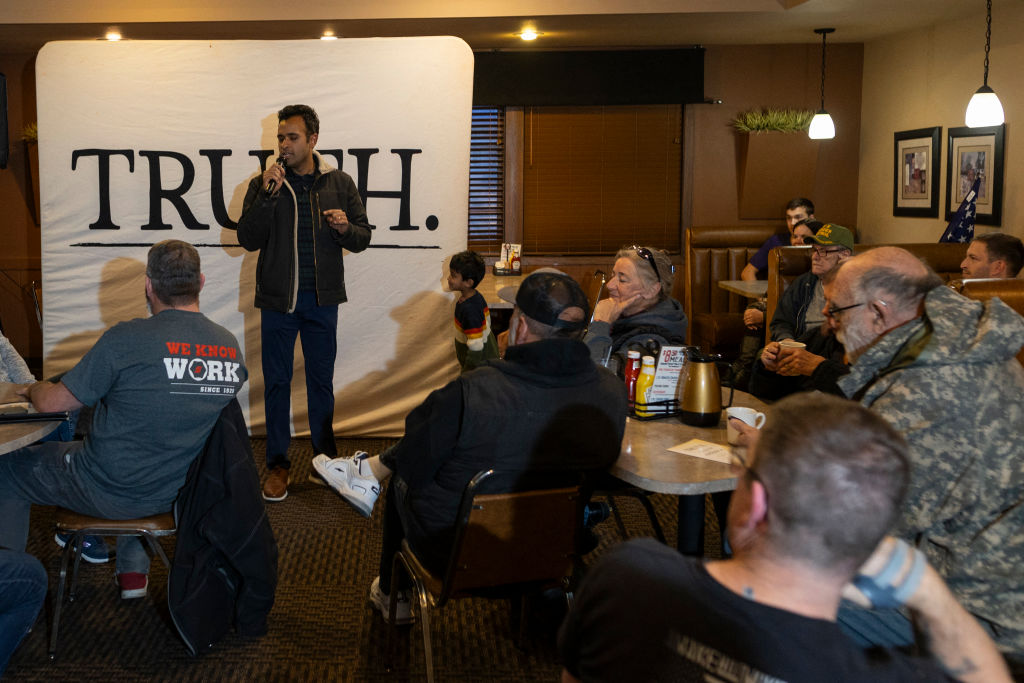WEST DES MOINES, Iowa—It’s real quiet here in good old, first-in-the-nation Iowa.
In fact, with less than five weeks to go until the Iowa caucuses, it’s positively serene. Jolly, even. This is my fifth presidential cycle coming here, and by this point, there’s usually plenty of campaign messaging mixed in with the Christmas decorations, yard signs wrapped in tinsel, and holiday-themed candidate events.
Not this time. Here in Whoville, the campaign grinches have barely been able to make a dent in the season’s greetings. Drive through any neighborhood or talk to anyone not directly involved in a campaign and you might have to remind them that there’s a presidential contest going on.
One lovely woman—a stranger to me, but immediately recognizable as a grandmotherly, retired professional, pillar-of-the-community type—stopped me outside a store because she wanted to say a friendly “hello” to someone she knew from the television and welcome me to town. She asked me what I was doing in Des Moines. After all, don’t I live in Washington? I just looked at her with smiling eyes for a few beats of Michael Bublé blaring from the speakers above. Her eyes widened a bit. “Oh that’s right,” she said with mild self-reproach. “The caucuses!”
But it was a pretty good question, ma’am. What am I doing here, anyway? Even the old political hands and campaign veterans whom I hassle for a tip or a vibe or anything—people who owe a lot of their professional success to the nation’s quadrennial fascination with Iowa politics—have the same question.
The Democrats aren’t having any caucuses at all, and the Republicans don’t have much of a race. The new numbers from the Des Moines Register, the high-test ethanol of Iowa polls, were out the morning I arrived, showing former President Donald Trump up by 32 points—5 points better than his already massive lead from October. For reference, the comparable poll from the 2016 cycle showed a 3-point race. For the 2012 cycle, the margin at the equivalent point was 7 points. Iowa Republicans may be prone to big swings late in the race, but this time around, Trump has never led by less than 20 points, and the poll shows that unlike in other cycles, most voters are already firmly determined in their choices.
If you were to draw up a way to finally sink the institution of the Iowa caucuses as we know them once and for all, the 2024 cycle would be pretty close.
Four years ago, Hawkeye State Democrats so thoroughly botched their contest that when President Joe Biden called on his party to ditch Iowa and its early-state twin, New Hampshire, members of the blue team here barely put up a fight—maybe with more relief than resentment.
I’m sure some Iowa Democrats will try to make a comeback for 2028, but after years of facing complaints about how their state was too white, too old, too Bernie for a party that wants to be young and ethnically diverse, it’s going to be tough to persuade the Democratic National Committee to go back to the frozen plains of Iowa.
But with an open seat on the Democratic side in 2028—barring a Biden win followed by an incomplete term in office—there will certainly be an effort here to get things cranked back up. One imagines Transportation Secretary Pete Buttigieg drifting off to sleep each night counting down Iowa’s 99 counties like sheep, starting with Wright and down to Adair. But inertia is a powerful force in politics, and by then the most recent good-news story about the Iowa caucuses on the Democratic side will have been Barack Obama’s moonshot 20 years prior.
But what about the Republicans? They will have an open seat no matter what, since Trump will be term-limited if he wins. Surely as Florida Gov. Ron DeSantis and former South Carolina Gov. Nikki Haley wend their ways between the Pizza Ranches, they are thinking about the value their efforts now might have four years hence. There’s always next time …
But Iowa Republicans have another consideration: their reputation for disruption. For such a polite bunch, Iowa GOPers value their knack for upsetting the political order. In 2008, 2012, and 2016, Iowans rebuffed the national frontrunner and empowered an underdog. Certainly Iowa Republican influencers, including Gov. Kim Reynolds and Christian conservative organizer Bob Vander Plaats, are trying to do for DeSantis what Iowans did for Mike Huckabee, Rick Santorum, and Ted Cruz in the past and give the Floridian a boost into the rest of the race.
So far, though, there’s not much “Iowa stubborn” to be found. Some of this may be unique to Trump—who manages to be both the establishment and anti-establishment at the same time—but it is also because of the ways in which Iowa has changed politically.
Until recently a Democratic-leaning swing state, Iowa has followed the same path as Ohio and Wisconsin in the past decade and become much more hospitable to Republicans. If the GOP carries Iowa in 2024, as is widely expected, it will be the first three-peat for the red team in Iowa since Richard Nixon, Gerald Ford, and Ronald Reagan held serve here two generations ago.
Minority parties behave differently in presidential preference contests than those in the majority. When Iowa was a Democratic state, the average voter was more likely to caucus with the blue team, meaning that intense minorities on the Republican side could have a disproportionate effect. But in a majority-Republican state, especially if the Democrats have abandoned the institution for good, the caucuses will look less like a strange test of on-the-ground organization and grassroots support, and more like another poll of national sentiment.
Reynolds, Vander Plaats, and the other big-name boosters of both DeSantis and Haley have more on the line than just their reputations as kingmakers. A sleepy one-party presidential contest would diminish Iowa’s clout going forward. Getting politicians to sing the praises of ethanol, take meetings on soybean exports, and think Iowa first for plum appointments at home and abroad is a lot easier when your state has the power to make or break a presidential campaign.
But maybe, after 48 years at the head of the line, Iowans are ready to just enjoy their Christmases and stop entertaining the presidential fantasies of a new crop of politicians every four years. I can’t say that I would blame them, even if I would miss their hospitality.







Please note that we at The Dispatch hold ourselves, our work, and our commenters to a higher standard than other places on the internet. We welcome comments that foster genuine debate or discussion—including comments critical of us or our work—but responses that include ad hominem attacks on fellow Dispatch members or are intended to stoke fear and anger may be moderated.
With your membership, you only have the ability to comment on The Morning Dispatch articles. Consider upgrading to join the conversation everywhere.